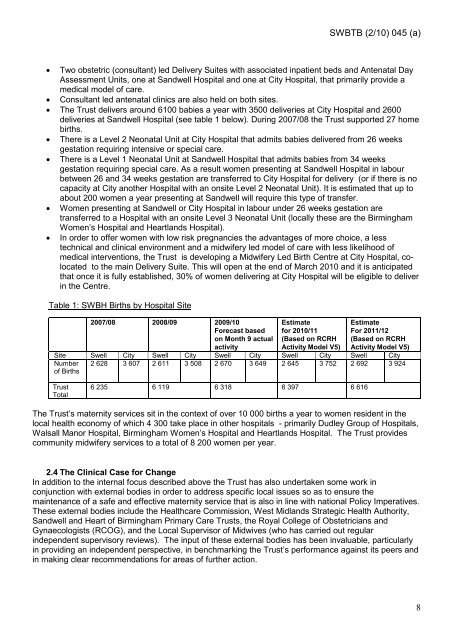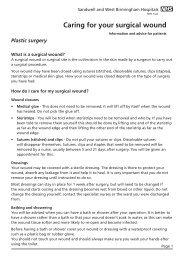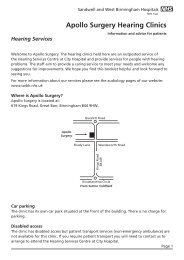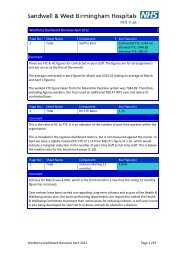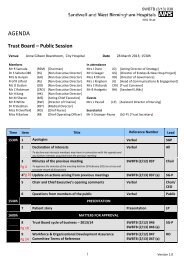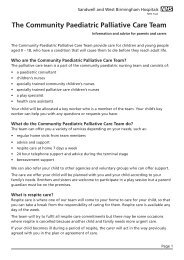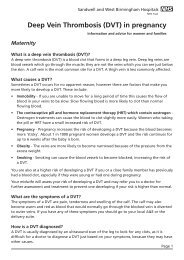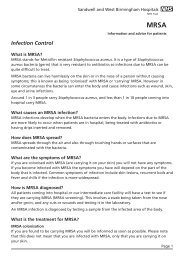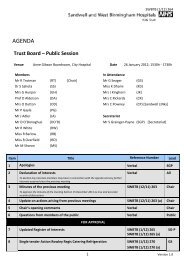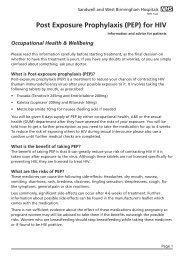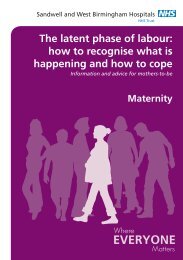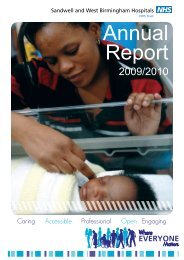Trust Board Febuary 2010 - Sandwell & West Birmingham Hospitals
Trust Board Febuary 2010 - Sandwell & West Birmingham Hospitals
Trust Board Febuary 2010 - Sandwell & West Birmingham Hospitals
Create successful ePaper yourself
Turn your PDF publications into a flip-book with our unique Google optimized e-Paper software.
SWBTB (2/10) 045 (a)<br />
• Two obstetric (consultant) led Delivery Suites with associated inpatient beds and Antenatal Day<br />
Assessment Units, one at <strong>Sandwell</strong> Hospital and one at City Hospital, that primarily provide a<br />
medical model of care.<br />
• Consultant led antenatal clinics are also held on both sites.<br />
• The <strong>Trust</strong> delivers around 6100 babies a year with 3500 deliveries at City Hospital and 2600<br />
deliveries at <strong>Sandwell</strong> Hospital (see table 1 below). During 2007/08 the <strong>Trust</strong> supported 27 home<br />
births.<br />
• There is a Level 2 Neonatal Unit at City Hospital that admits babies delivered from 26 weeks<br />
gestation requiring intensive or special care.<br />
• There is a Level 1 Neonatal Unit at <strong>Sandwell</strong> Hospital that admits babies from 34 weeks<br />
gestation requiring special care. As a result women presenting at <strong>Sandwell</strong> Hospital in labour<br />
between 26 and 34 weeks gestation are transferred to City Hospital for delivery (or if there is no<br />
capacity at City another Hospital with an onsite Level 2 Neonatal Unit). It is estimated that up to<br />
about 200 women a year presenting at <strong>Sandwell</strong> will require this type of transfer.<br />
• Women presenting at <strong>Sandwell</strong> or City Hospital in labour under 26 weeks gestation are<br />
transferred to a Hospital with an onsite Level 3 Neonatal Unit (locally these are the <strong>Birmingham</strong><br />
Women’s Hospital and Heartlands Hospital).<br />
• In order to offer women with low risk pregnancies the advantages of more choice, a less<br />
technical and clinical environment and a midwifery led model of care with less likelihood of<br />
medical interventions, the <strong>Trust</strong> is developing a Midwifery Led Birth Centre at City Hospital, colocated<br />
to the main Delivery Suite. This will open at the end of March <strong>2010</strong> and it is anticipated<br />
that once it is fully established, 30% of women delivering at City Hospital will be eligible to deliver<br />
in the Centre.<br />
Table 1: SWBH Births by Hospital Site<br />
2007/08 2008/09 2009/10<br />
Forecast based<br />
on Month 9 actual<br />
activity<br />
Estimate<br />
for <strong>2010</strong>/11<br />
(Based on RCRH<br />
Activity Model V5)<br />
Estimate<br />
For 2011/12<br />
(Based on RCRH<br />
Activity Model V5)<br />
Site Swell City Swell City Swell City Swell City Swell City<br />
Number<br />
of Births<br />
2 628 3 607 2 611 3 508 2 670 3 649 2 645 3 752 2 692 3 924<br />
<strong>Trust</strong><br />
Total<br />
6 235 6 119 6 318 6 397 6 616<br />
The <strong>Trust</strong>’s maternity services sit in the context of over 10 000 births a year to women resident in the<br />
local health economy of which 4 300 take place in other hospitals - primarily Dudley Group of <strong>Hospitals</strong>,<br />
Walsall Manor Hospital, <strong>Birmingham</strong> Women’s Hospital and Heartlands Hospital. The <strong>Trust</strong> provides<br />
community midwifery services to a total of 8 200 women per year.<br />
2.4 The Clinical Case for Change<br />
In addition to the internal focus described above the <strong>Trust</strong> has also undertaken some work in<br />
conjunction with external bodies in order to address specific local issues so as to ensure the<br />
maintenance of a safe and effective maternity service that is also in line with national Policy Imperatives.<br />
These external bodies include the Healthcare Commission, <strong>West</strong> Midlands Strategic Health Authority,<br />
<strong>Sandwell</strong> and Heart of <strong>Birmingham</strong> Primary Care <strong>Trust</strong>s, the Royal College of Obstetricians and<br />
Gynaecologists (RCOG), and the Local Supervisor of Midwives (who has carried out regular<br />
independent supervisory reviews). The input of these external bodies has been invaluable, particularly<br />
in providing an independent perspective, in benchmarking the <strong>Trust</strong>’s performance against its peers and<br />
in making clear recommendations for areas of further action.<br />
8


